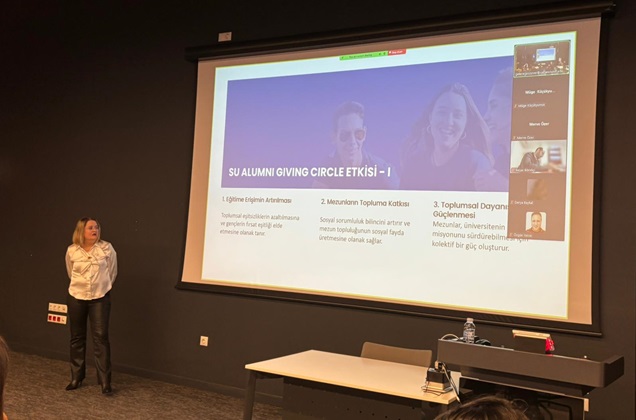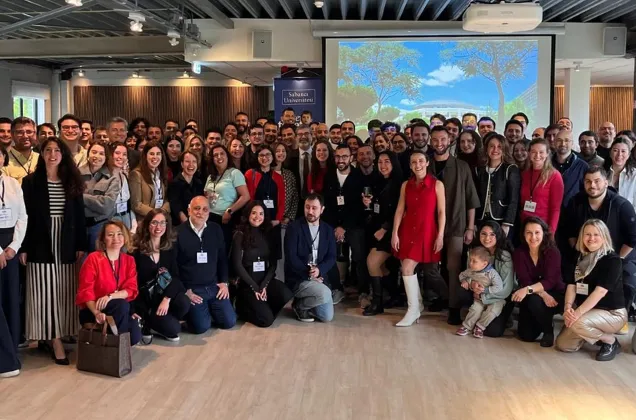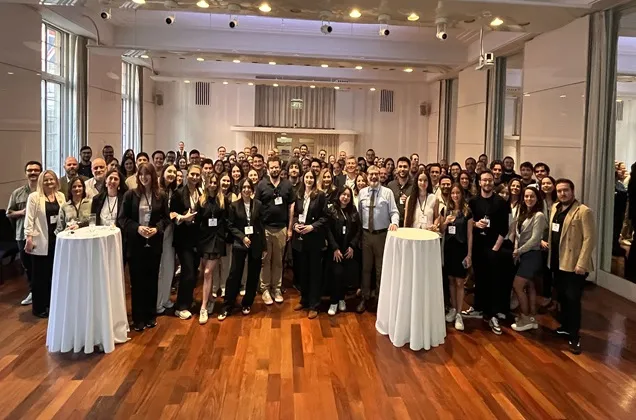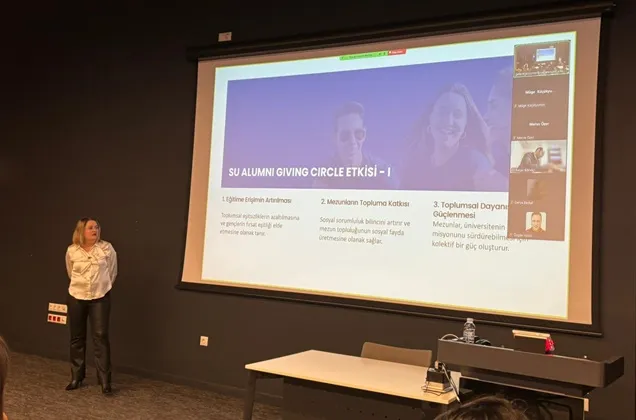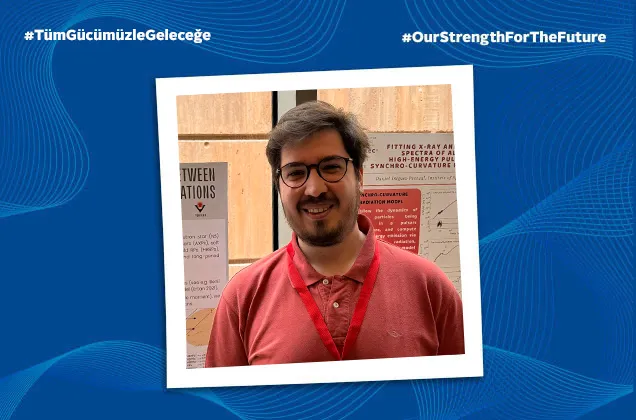14/03/2024
Sabancı University Computer Science and Engineering Department graduate Gökçe Uğur's recipe for lentil balls, one of the delicacies of Turkish cuisine, was included in the cookbook released for God of War Ragnarök developed for Playstation 4&5.
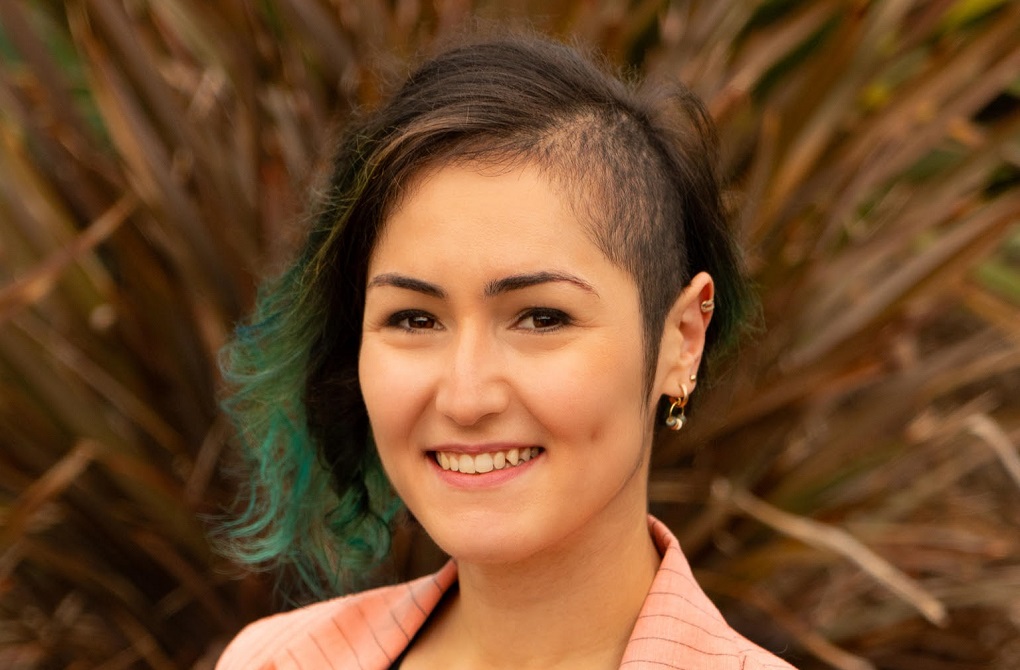
We interviewed our graduate, who has achieved international success, about her educational life, her career journey, and the recipe in the book.
Can you tell us about the education you received at Sabancı University?
I started Sabancı University in 2008 at the Faculty of Engineering and graduated from the Department of Computer Science and Engineering in 2012. But I was very close to graduating from the Visual Communication Design department. In fact, my sister was one of the first students to enter the university in 1999. That's why I felt like I grew up with Sabancı University and Sabancı University grew up with me. But the most important reason why I chose this place was that I wasn't sure what to do in the future. In my first two years, I took many courses from the Engineering and Arts faculties. While I was learning the basics of programming by writing simple Pacman games, I also found myself making huge sculptures out of blue foam. Although my interest in programming eventually became more dominant, my desire to combine what I learned in two different fields led me to the gaming industry, where I currently work with great pleasure.
How did this education benefit you?
Of course, I built my programming career on the solid foundation I received at university. At the same time, I use what I learned in the field of art and design while making games in my business life. I think that telling interactive stories, offering people meaningful experiences, that is, making games, is essentially about understanding society and human nature well. In this respect, what I learned during university in fields such as social sciences, literature, art, and history became an important resource for me. This diversity in courses has not only been beneficial in my professional life, but has also been effective in my personal life and personal development. Beyond academic education, I can also mention student clubs, campus life, and many events I participate in. I think that by taking advantage of the opportunities Sabancı offered me, I developed a perspective that enabled me to go beyond my comfort zone, research, criticize, be open to innovations, and give importance to learning new things at every opportunity.
How was your educational life shaped after your undergraduate education?
In fact, while I was preparing to graduate in my last year, I had already made the decision to do a master's degree abroad. I wanted to improve myself in the field of gaming and learn this business at its core. After a long period of research and preparation, I was accepted into the Entertainment Technology master's degree at Carnegie Melon University a year after graduation. Similar to the education I received at Sabancı, this program also placed great emphasis on training well-rounded students for the entertainment industry. I took courses and learned new things in many fields, from game design to entrepreneurship and improvisational acting. Since it is a completely project-based school, it was also very useful for me to develop practical experience based on the theoretical education I received and to learn to work as a team.
Can you tell us about your career journey after education?
The year I graduated, upon the suggestion of my friend from university, I started working as a software developer in a small game company founded by Sabancı graduates. This work experience, although short-term, was very useful for me. The experiences I gained in the master's program I attended afterwards were definitely the key to entering the gaming industry in the US. Thanks to this program, I worked on game projects for different companies, including EA Games. Afterwards, I was accepted for an internship at Visual Concepts studio. After working on the release of the NBA2K15 game, I started working full-time at this studio in 2015. After contributing to NBA2K16, NBA2K17, and NBA2K18 games, I moved to Playstation's Santa Monica Studio when we moved from San Francisco to Los Angeles in 2017. As a gameplay programmer in God of War (2018), I worked in many different areas of the game. Afterwards, I started to focus on the AI field and worked as the AI Lead in the God of War Ragnarök game. I am currently working as Lead AI & Progression Systems Programmer on the studio's next project.
What are your responsibilities as “Lead AI & Progression Systems Programmer” at Sony Santa Monica?
The team I currently lead actually includes two different teams. The AI team is responsible for the development of all systems necessary for the operation of the enemies, companions, and NPCs (non-playable characters) in the game. The Progression team is responsible for all systems (equipment, skills, quests, resources, etc.) and UI systems developed by the player throughout the game.
My responsibility is to ensure that my team functions soundly throughout the project, stays in communication with other teams, and ensures that our studio delivers systems at the quality bar. Among the things I do to achieve this, there are responsibilities such as coming together with other team leaders and determining the necessary systems, making the technical plan of these systems, working with the production teams to create a schedule, and distributing the tasks to the team. Of course, besides these, I still devote some of my time to programming the AI systems that I am responsible for.
A suggestion from Turkish cuisine was included in the cookbook published for God of War Ragnarök, developed for Playstation 4&5. Can you explain the process?
God of War: The Official Cookbook contains more than 60 recipes written by the character Tyr in the game. Of course, the recipes were actually developed by our cookbook author, Victoria Rosenthal. However, unlike many game cookbooks that have become popular recently, it also includes recipes from us, the developers of the game. For this reason, God of War is a project created for the fans of our game as well as for our game developer team. We have a studio culture that loves trying new recipes together, cooking, and organizing cake competitions. Therefore, while the book was being written, they asked our team to send their own recipes. The first thing that came to my mind was lentil balls. I created a new recipe by blending my mother's classic recipe with my own favorite flavors. Victoria made the final touches and the final version you see in the book was created. Thus, I was included in the recipe book that I wanted so much to be written for a game in which I was both the player and the developer, with a recipe that was so close to my roots and childhood.
What advice would you give to our graduates who want to follow in your footsteps?
Game development is a job that requires people from many different disciplines to come together and offer creative solutions to many problems. Therefore, I recommend that they first improve themselves in the discipline they want to focus on. Apart from that, it will definitely be beneficial for them to improve their ability to work in a team and learn a little about other disciplines, beyond just individual projects. But most importantly, they should practice a lot. Making games is a skill that develops when repeated regularly. That's why I definitely advise you make your own games. I think there is nothing that will improve you more than working on game projects of different durations with large and small teams. Nowadays, it is very easy to access game engines and tutorials that you can use for free. Apart from that, it can also be helpful to watch the presentations made by those working in the sector that you can find on the internet, to participate in events such as Gamejam, to meet people who are interested in the field or working in the sector, and share experiences. Of course, don't forget to play a lot of games to do research ;)
